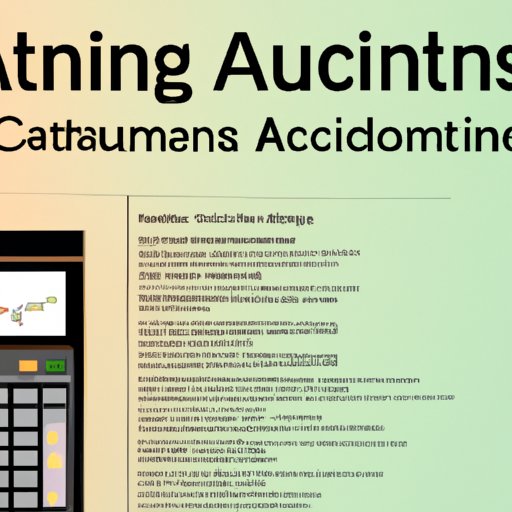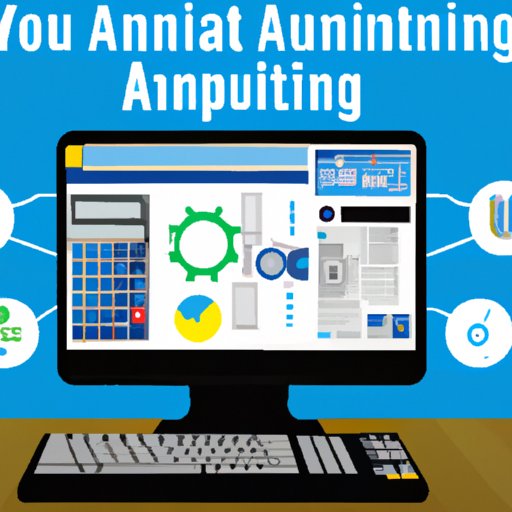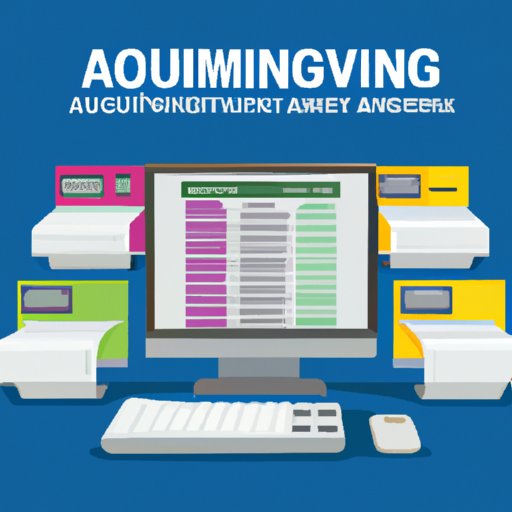Introduction
Automated accounting is a form of accounting where tasks are automated through software, eliminating manual data entry and making financial processes faster and more efficient. Automated accounting systems are designed to reduce errors, save time, and increase accuracy when managing financial data. In this guide, we’ll take a closer look at what automated accounting is, its benefits, and how you can get started using it in your business.

The Basics of Automated Accounting: What You Need to Know
Before getting into the specifics of automated accounting, let’s start with the basics. Automated accounting is the process of automating certain accounting tasks such as invoicing, expense tracking, financial reporting, and more. By automating these tasks, businesses can save time and effort on manual data entry, which can be both time-consuming and error-prone. Additionally, automated accounting makes it easier to keep track of financial data and provide accurate reports.
Common automated accounting tasks include:
- Financial reporting
- Accounts receivable
- Accounts payable
- Data entry
- Invoicing
- Expense tracking
There are several advantages to using automated accounting:
- It saves time and money by reducing manual data entry
- It increases accuracy by eliminating human error
- It simplifies complex financial processes
- It allows for more efficient reporting and analysis
- It reduces the risk of fraud and mismanagement
How Automated Accounting Can Streamline Your Business
Automated accounting can help streamline your business in several ways. Let’s take a look at some of the most common ways that automated accounting can help improve your business operations.
Automation of Financial Reporting
Automated accounting systems make it easy to generate financial reports quickly and accurately. This eliminates the need to manually enter data and can help simplify complex financial reporting processes. Automated accounting systems also make it easier to track and analyze financial data, allowing you to make better decisions about your business.
Automation of Accounts Payable and Receivable
Automated accounting systems can automate the accounts payable and receivable process, eliminating the need to manually enter data and ensuring accuracy. Automated accounting systems can also help streamline invoice processing, making it easier to stay on top of payments and manage cash flow.
Automation of Data Entry
By automating data entry, you can eliminate the need to manually enter information into spreadsheets or other software. Automated accounting systems can also help ensure accuracy by eliminating potential errors caused by manual data entry. This can help simplify the process of managing financial data and reduce the risk of mistakes.
Automated Accounting: A Step-by-Step Guide
If you’re interested in taking advantage of automated accounting, here’s a step-by-step guide to get you started:
Setting Up Automated Accounting
The first step is to set up an automated accounting system. This involves selecting the right software, setting up the necessary accounts, and entering the necessary data. Depending on the complexity of your business operations, you may need to hire a professional to help you set up the system.
Choosing the Right Automated Accounting Software
When choosing automated accounting software, there are several factors to consider. First, you need to determine which features are most important for your business. For example, if you need to track inventory, you’ll want to make sure the software has the ability to do so. Additionally, you’ll want to make sure the software is compatible with your existing systems and processes.
Implementing Automated Accounting
Once you’ve chosen the right software, it’s time to implement it. This includes setting up the system, training employees, and testing to make sure everything is working correctly. It’s important to make sure all employees understand how to use the system, as well as any security protocols that need to be followed.
The Future of Automated Accounting
As technology continues to evolve, automated accounting systems will become more advanced and powerful. Here are some of the trends we’re likely to see in the future:
Trends in Automated Accounting
- Increased integration with other software and systems
- Improved security protocols
- More powerful analytics capabilities
- Greater automation of financial processes
Benefits of Automated Accounting in the Future
As automated accounting systems become more advanced, businesses will reap the benefits of greater efficiency and accuracy. Automated accounting systems will help businesses save time and money, as well as reduce the risk of fraud and mismanagement. Additionally, automated accounting systems will make it easier to generate accurate financial reports and perform data analysis.

Common Questions about Automated Accounting
Now that you have a better understanding of automated accounting, let’s take a look at some common questions about the topic.
What are the Benefits of Automated Accounting?
The benefits of automated accounting include increased accuracy, improved efficiency, simplified financial processes, and reduced risk of fraud and mismanagement. Automated accounting systems can also help generate accurate financial reports and simplify data entry.
What is the Difference between Manual and Automated Accounting?
Manual accounting requires manual data entry and is prone to errors. Automated accounting eliminates manual data entry and helps ensure accuracy. Additionally, automated accounting systems can automate complex financial processes and make it easier to generate financial reports.
What are the Disadvantages of Automated Accounting?
The main disadvantage of automated accounting is the cost. Automated accounting systems can be expensive to purchase and maintain. Additionally, some automated accounting systems can be difficult to set up and use, requiring specialized knowledge and training.

Automated Accounting Software: What to Look For
When choosing automated accounting software, it’s important to consider several factors. Here are some things to look for when selecting automated accounting software:
Features to Look for in Automated Accounting Software
- Integration with other software and systems
- Compatibility with existing systems and processes
- Secure data storage and encryption
- Robust analytics and reporting capabilities
- User-friendly interface
Price Considerations When Choosing Automated Accounting Software
Price is always a factor when choosing software, but it’s important to remember that the cheapest option may not be the best. Make sure to compare the features and pricing of different automated accounting software before making a decision.
Security Considerations When Choosing Automated Accounting Software
Security is critical when choosing automated accounting software. Make sure to choose a system that offers secure data storage and encryption, as well as robust user authentication and access control.
Conclusion
Automated accounting is a powerful tool that can help businesses save time, money, and effort. Automated accounting systems can automate complex financial processes, streamline data entry, and generate accurate financial reports. When choosing automated accounting software, make sure to consider features, price, and security. With the right system in place, automated accounting can help make your business more efficient and profitable.
(Note: Is this article not meeting your expectations? Do you have knowledge or insights to share? Unlock new opportunities and expand your reach by joining our authors team. Click Registration to join us and share your expertise with our readers.)
